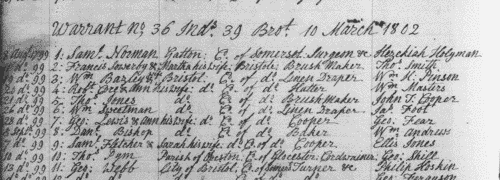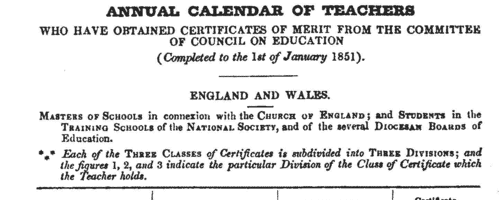Batchelder Surname Ancestry ResultsOur indexes 1000-1999 include entries for the spelling 'batchelder'. In the period you have requested, we have the following 43 records (displaying 11 to 20): Single Surname Subscription | | | Buying all 43 results of this search individually would cost £242.00. But you can have free access to all 43 records for a year, to view, to save and print, for £100. Save £142.00. More... |
These sample scans are from the original record. You will get scans of the full pages or articles where the surname you searched for has been found. Your web browser may prevent the sample windows from opening; in this case please change your browser settings to allow pop-up windows from this site.  Apprentices registered in Norfolk
(1802) Apprentices registered in Norfolk
(1802)
Apprenticeship indentures and clerks' articles were subject to a 6d or 12d per pound stamp duty: the registers of the payments usually give the master's trade, address, and occupation, and the apprentice's name, as well as details of the date and length of the apprenticeship. There are central registers for collections of the stamp duty in London, as well as returns from collectors in the provinces. These collectors generally received duty just from their own county, but sometimes from further afield. The indentures themselves can date from a year or two earlier than this return. (The sample entry shown on this scan is taken from a Bristol return. Each entry has two scans, the other being the facing page with the details of the indenture, length of service, and payment of duty.) IR 1/70BATCHELDER. Cost: £8.00.  | Sample scan, click to enlarge

| Cambridgeshire Voters: Cambridge
(1832)
The poll on the election of three knights of the shire to serve in Parliament for the county of Cambridge, was taken at Cambridge, Royston, Newmarket, Ely, Wisbech and Whittlesea 18 and 19 December 1832. The candidates were Henry John Adeane esquire, Richard Greaves Townley esquire, Charles Philip Yorke esquire and John Walbanke Childers esquire. This poll book sets out the names of the voters in alphabetical order hundred by hundred and parish by parish. The voters' full names are stated, surname first. The right hand column records their votes. The new qualification for suffrage in the counties, after the passage of the 1832 Great Reform Bill, was the possession of a freehold estate worth 40s a year or more, a copyhold or long leasehold of £10 a year or more, or a tenancy or short leasehold of £50 a year or more.
BATCHELDER. Cost: £6.00.  | Sample scan, click to enlarge

| Voters in the Eastern Division of Norfolk, for the parish of Bergh Apton, near Loddon
(1832)
Under the Reform Act of 1832, the County of Norfolk was allotted four Members of Parliament, being two Knights of the Shire for the Eastern Division and two for the Western. The Eastern Division included the hundreds of Blofield, Clavering, Depwade, Diss, Earsham, North Erpingham, South Erpingham, Eynsford, East Flegg, West Flegg, Forehoe, Happing, Henstead, Humbleyard, Loddon, Taverham, Tunstead and Walsham. The franchise was available to freeholders worth 40s a year or over; copyholders and long leaseholders of £10 or more; short leaseholders and tenants of £50 or more: but limited to adult males. Voting took place on 20 and 21 December 1832. This poll book lists the voters for each parish, with the votes cast. Voting was not compulsory, and non-voters are not listed. Each voter had two votes: the votes are indicated in the columns C. (Lord Henry Cholmondeley, 2852); P. (Nathaniel William Peach, 2960); K. (Hon. George Keppel, 3261); and W. (William Howe Windham, 3304). The voters were not necessarily resident in the parish, but derived their franchise from the land there; so some of the names have addresses outside the parish. After the name there may appear the abbreviations cop. for copyholder; oc. for occupier; or le. for leaseholder: the rest are freeholders or annuitants.BATCHELDER. Cost: £6.00.  | Sample scan, click to enlarge

| Voters in the Eastern Division of Norfolk, for the parish of Hedenham, near Bungay
(1832)
Under the Reform Act of 1832, the County of Norfolk was allotted four Members of Parliament, being two Knights of the Shire for the Eastern Division and two for the Western. The Eastern Division included the hundreds of Blofield, Clavering, Depwade, Diss, Earsham, North Erpingham, South Erpingham, Eynsford, East Flegg, West Flegg, Forehoe, Happing, Henstead, Humbleyard, Loddon, Taverham, Tunstead and Walsham. The franchise was available to freeholders worth 40s a year or over; copyholders and long leaseholders of £10 or more; short leaseholders and tenants of £50 or more: but limited to adult males. Voting took place on 20 and 21 December 1832. This poll book lists the voters for each parish, with the votes cast. Voting was not compulsory, and non-voters are not listed. Each voter had two votes: the votes are indicated in the columns C. (Lord Henry Cholmondeley, 2852); P. (Nathaniel William Peach, 2960); K. (Hon. George Keppel, 3261); and W. (William Howe Windham, 3304). The voters were not necessarily resident in the parish, but derived their franchise from the land there; so some of the names have addresses outside the parish. After the name there may appear the abbreviations cop. for copyholder; oc. for occupier; or le. for leaseholder: the rest are freeholders or annuitants.BATCHELDER. Cost: £6.00.  | Sample scan, click to enlarge

| Voters in the Eastern Division of Norfolk, for the parish of Wortwell, near Harleston
(1832)
Under the Reform Act of 1832, the County of Norfolk was allotted four Members of Parliament, being two Knights of the Shire for the Eastern Division and two for the Western. The Eastern Division included the hundreds of Blofield, Clavering, Depwade, Diss, Earsham, North Erpingham, South Erpingham, Eynsford, East Flegg, West Flegg, Forehoe, Happing, Henstead, Humbleyard, Loddon, Taverham, Tunstead and Walsham. The franchise was available to freeholders worth 40s a year or over; copyholders and long leaseholders of £10 or more; short leaseholders and tenants of £50 or more: but limited to adult males. Voting took place on 20 and 21 December 1832. This poll book lists the voters for each parish, with the votes cast. Voting was not compulsory, and non-voters are not listed. Each voter had two votes: the votes are indicated in the columns C. (Lord Henry Cholmondeley, 2852); P. (Nathaniel William Peach, 2960); K. (Hon. George Keppel, 3261); and W. (William Howe Windham, 3304). The voters were not necessarily resident in the parish, but derived their franchise from the land there; so some of the names have addresses outside the parish. After the name there may appear the abbreviations cop. for copyholder; oc. for occupier; or le. for leaseholder: the rest are freeholders or annuitants.BATCHELDER. Cost: £6.00.  | Sample scan, click to enlarge

| Electors of Burgh Apton
(1840)
The register of electors entitled to vote in any parliamentary election for East Norfolk between 1 November 1840 and 1 November 1841 lists 8,556 freeholders arranged by hundred and within hundred by parish or township &c. In the first column, after number within the register, the elector's name is given (surname first); the second column gives place of abode; the third column the nature of qualification (such as 'owner and occupier'); and the fourth column the address of the qualifying property, in some cases with the name of the tenant or occupier.BATCHELDER. Cost: £4.00.  | Sample scan, click to enlarge

| Anglican Schoolmasters
(1850)
The Committee of Council on Education awarded certificates of merit to teachers throughout Britain, and published annual lists of those qualifying in the previous years. Masters and mistresses are listed separately, with surname and initials, and school at which teaching, post town or county, and grade of the certificate: each of the three classes of certificate being subdivided into three. There are five separate lists for masters and mistresses:
1. Teachers in schools in connexion with the Church of England; male students in the Training Schools of the National Society, and of the several Diocesan Boards of Education; and female students in the Training Schools of the National Society (Whitelands, Chelsea), the Home and Colonial School Society (Gray's Inn Road, Holborn), and the Salisbury and York and Ripon Diocesan Boards of Education.
2. Teachers, in England and Wales, of British, Wesleyan and other Protestant Schools, not in connexion with the Church of England;
3. Teachers, in England and Wales, of Roman Catholic Schools;
4. Teachers of schools in Scotland, in connexion with the Established Church; male students in the Edinburgh and Glasgow Training Colleges; and female students in training schools.
5. Teachers of schools in Scotland, not in connexion with the Established Church; male students in the Training Schools of the Free Church (at Edinburgh and Glasgow); and female students in training schools.
This is the list, corrected to 1 January 1851, published in 1851.BATCHELDER. Cost: £4.00.  | Sample scan, click to enlarge

|  Residents of Pump Court, Westminster
(1851) Residents of Pump Court, Westminster
(1851)
In the 1851 census, Westminster superintendent registrar's district, St Margaret's registrar's district, enumeration district 13 comprised part of St Margaret's parish and Christ Church ecclesiastical district in the city of Westminster. HO 107/1480.BATCHELDER. Cost: £2.00.  | Sample scan, click to enlarge

| Traders and professionals in London
(1856)
The Post Office London Directory for 1856 includes this 'Commercial and Professional Directory', recording over 100,000 individuals. BATCHELDER. Cost: £4.00.  | Sample scan, click to enlarge

|  London Policemen
(1843-1857) London Policemen
(1843-1857)
The Metropolitan Police Register of Joiners (MEPO 4/334) lists policemen joining the force 1 January 1843 to 1 April 1857 (warrant numbers 19893 to 35804). The register is alphabetical, in so far as the recruits are listed chronologically grouped under first letter of surname. It gives Date of Appointment, Name, Number of Warrant, Cause of Removal from Force (resigned, dismissed, promoted or died), and Date of Removal. Although the register was closed for new entrants at the end of 1842, the details of removals were always recorded, some being twenty or more years later. Those recruits not formerly in the police, the army, or some government department, were required to provide (normally) at least two letters of recommendation from persons of standing, and details of these are entered on the facing pages: the names in these are indexed separately - this index refers only to the police constables. Where a recruit was only recently arrived in the metropolis, the names and addresses of the recommenders can be invaluable for tracing where he came from.BATCHELDER. Cost: £8.00.  | Sample scan, click to enlarge

|
Research your ancestry, family history, genealogy and one-name study by direct access to original records and archives indexed by surname.
|













